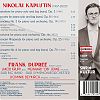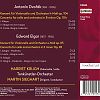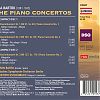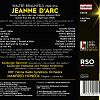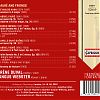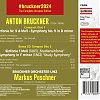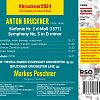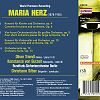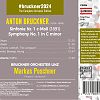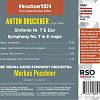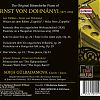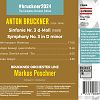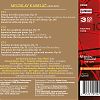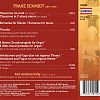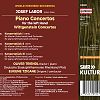releases
2024 Releases

NIKOLAI KAPUSTIN - Piano Concertos Nos. 2 & 6
Variations Op. 3 · Toccata Op. 8 · Concert Rhapsody Op. 25 · Nocturne Op. 16
Frank Dupree · SWR Big Band · SWR Symphonieorchester · Dominik Beykirch
C5528 PC: 21 UPC: 845221055282
When the music of Nikolai Kapustin was discovered by a wider audience in the West, it was positively shocking: Who was this Soviet (!) composer, whose music sounded more like an Oscar Peterson improvisation than anything else – but who wrote detailed scores, black with notes?! As we discover more and more of his music and as we again can hear on the present recording, Kapustin developed his style subtly and steadily. He went with the times. As the music that influenced him changed, so did Kapustin’s. The development of Big Band Jazz can be traced in his work. In that sense Kapustin never settled on one style (within the parameters of his unique fusion of jazz and classical, granted) but remained flexible about the musical material and the way he related it to the orchestra.
Weitere Bilder

HARRIET KRIJGH - Dvorak / Elgar Cello Concertos
Harriet Krijgh, cello
Tonkünstler-Orchester Martin Sieghart
C5534 PC: 21 UPC: 845221055343
Harriet Krijgh is one of today’s most exciting and promising young cellists. Her grace and expressiveness touch her audiences as soon as she is on the concert platform. Her discography also comprises of six discs, all released by Capriccio in the last six years, featuring music by Kabalewski, Haydn, Brahms, Rachmaninov as well as several French composers. Krijgh is winner of numerous competitions. She was chosen "Rising Star" of by the European Concert Hall Organisation (ECHO) and was artistic director of the Utrecht Chamber Music Festival in 2017 and 2018. With the present CD she made a long-held wish come true and presents two of the most popular cello concertos by Dvorak and Elgar.
Weitere Bilder

BÉLA BARTÓK - The Piano Concertos
TZIMON BARTO, piano
Deutsches Symphonie-Orchester Berlin · Christoph Eschenbach
C5537 · 2CD PC: 21 UPC: 845221055374
Béla Bartók is one of the unquestionably “great” composers and one of the few modern composers who established themselves in the repertoire. His three piano concertos are central to his biography and musical output, but only the Third, with some generosity, could be considered “popular”. Although well represented on disc, the first two are rare concert program guests. Tzimon Barto sees a problem in an all-too-mechanical approach to these two percussive works: “Even Bartók needs a supple touch. If you bang away at it, without rhythmical buoyancy, of course it will become tedious.” These recordings are his attempt, at doing justice to his Bartók-ideal.
Weitere Bilder

Alfred Schnittke - Film Music Vol. 6
LITTLE TRAGEDIES (1979)
Svetlana Mamresheva · Martha Jurowski · Elisaveta Blumina · Maxim Suchanow · RUNDFUNK-SINFONIEORCHESTER BERLIN · VLADIMIR JUROWSKI
C5496 PC: 21 UPC: 845221054964
Alfred Schnittke’s film music encapsulates almost everything that characterises the Russian composer’s compositional style. A self-described polystylist, he began writing for film in the 1960s, penning 66 film scores between 1962 and 1984 for Soviet film companies. His method of drawing on the past was rejected by the avant-garde but embraced by filmgoers and concertgoers too. Volume six in this CD Edition of Schnittke’s film music presents music from the film series "Little Tragedies" (1979) based on popular novels by Alexander Pushkin. After longtime research conductor Vladimir Jurowski also recorded all parts of the score which have been cancelled at the end for the final Film Version.

WALTER BRAUNFELS - JEANNE D'ARC
Scenes from the Life of Saint Joan, Op. 57 (1943)
Juliane Banse · Johan Reuter · Pavol Breslik Norbert Ernst Salzburger Bachchor ORF Vienna Radio Symphony Orchestra MANFRED HONECK
C5515 PC: 22 UPC: 845221055152
Weitere Bilder

Premiere Portraits - IRÈNE DUVAL
REYNALDO HAHN · GABRIEL FAURÉ · GEORGE ENESCU CAMILLE SAINT-SAËNS
IRÈNE DUVAL, violin ANGUS WEBSTER, piano
C3011 PC: 01 UPC: 845221030111
Praised for “her mastery of phrasing and of the dramatic dimension” (Diapason), “astonishing virtuosity” (Revelation Classiques) and “her infinite delicacy” (Le Populaire du centre), French violinist Irène Duval is establishing herself as a uniquely compelling performer with a strong interest in combining works central to the repertoire with little-known gems. Born in France to a French father and Korean mother, Irène Duval grew up in Japan, Indonesia, and Hong Kong before returning to France at the age of eleven. She studied with Suzanne Gessner and Jean-Jacques Kantorow, before entering the Conservatoire National Supérieur de Musique de Paris in 2008 in the class of Roland Daugareil; in 2014 she joined the Kronberg Academy in Germany, where she studied with Mihaela Martin for three years.
Weitere Bilder

Beethoven - The Mahler Re-Orchestrations
Symphonies 3 · 5 · 7 · 9 / Overtures / String Quartet
Deutsche Staatsphilharmonie Rheinland-Pfalz Michael Francis
3CD-Set · C5484 PC: 22 UPC: 845221054841
Whenever Gustav Mahler spoke of Beethoven, he did so with an air of reverence: "Among poets and composers of more recent times we can, perhaps, name but three: Shakespeare, Beethoven, and Wagner.” And yet, Mahler the conductor considered Beethoven’s scores primarily a challenge; material that needed adapting and adopting to the orchestras and concert halls of his time. Richard Wagner had already prepared Beethoven’s scores and written about it in great detail. The balance of sound of the classical orchestra was off, and a return to previous states was out of the question, given the increased size of the concert halls. People knew of their existence, but it was not until 1927 that Erwin Stein, the composer, pianist, and music journalist active in Schoenberg’s circles, was able to report that all of Mahler’s conductor’s scores, replete with his “Retuschen” (retouchings), had in fact survived.

#bruckner24 Symphony #9
+ Bonus: Symphony in F minor 'Study Symphony' (1863)
Bruckner Orchester Linz · Markus Poschner
2CD-Set C8096 PC: 21 UPC: 845221080963
This final release of Capriccios Bruckner Symphonies - The Complete Versions Edition includes his very first and last Symphony. In March 1861, Anton Bruckner completed his counterpoint studies with the renowned teacher Simon Sechter who had also taught Schubert. His graduation signaled the end of an extended compositional hiatus. Bruckner’s F-Minor Symphony was conceived in the classical and early romantic tradition of Beethoven, Schubert, Mendelssohn and Schumann.
Bruckner’s Ninth: his best (as some say) symphony, certainly his most daring and, thanks to the missing finale, his most mysterious. It is where Bruckner meets Mahler and, while working on it, his maker. He wanted to write a finale, of course, but too much remains missing. What is left, is a heavenly Adagio, which quietly fades away with references in the brass to the two preceding symphonies. Thus ends Bruckner’s uncompleted life’s work.
Weitere Bilder

#bruckner24 Symphony #3 (1877) + Adagio (1876)
(The Complete Versions Edition)
ORF VIENNA RADIO SYMPHONY ORCHESTRA BRUCKNER ORCHESTER LINZ · MARKUS POSCHNER
C8095 PC: 21 UPC: 845221080956
Anton Bruckner began the revision of his Third Symphony after completing the Fifth on 16 May 1876 and continued working on it sporadically until 28 April 1877. Then, after the Vienna Philharmonic rejected the Symphony for a third time, Bruckner’s friend, Hofkapellmeister Johann Herbeck, took matters into his own hands. He arranged to conduct the work himself on the concert series of the Society for the Friends of Music [Gesellschaftskonzerte] on 16 December 1877. After Herbeck passed away unexpectedly, Bruckner was forced to conduct the symphony himself. The performance proved to be one of the worst debacles of his career. The players were rude and unreceptive, and the audience left the concert hall in droves. Despite the public fiasco, Theodor Rättig, one of the few people who stayed, offered to publish the symphony. Two other people who were there at the end, Gustav Mahler and Rudolf Krzyzanowski, prepared a piano four-hand reduction for Rättig’s publication which appeared at the end of 1879. It was the first publication of a Bruckner Symphony.
Weitere Bilder

MARIA HERZ
Piano Concerto · Cello Concerto · Orchestral Works
Oliver Triendl Konstanze von Gutzeit RUNDFUNK-SINFONIEORCHESTER BERLIN · CHRISTIANE SILBER
C5510 PC: 21 UPC: 845221055107
Maria Herz, neé Bing, was born in 1878 in Cologne. By the 1920s, she became to be recognized as a dynamic element of the contemporary music scene. New music’s ‘chief theoretician’, Theodor W. Adorno, became interested in her works and their style, which was rooted in Late Romanticism and aimed at Modernism by way of Expressionism, New Objectivity, and Neo-Baroque, all while retaining its playful, charming air. She was close to a veritable Who’s-Who of contemporary musicians, including the Budapest String Quartett, Gregor Piatigorsky, Emanuel Feuermann, Hermann Abendroth, Otto Klemperer, and Hans Rosbaud.
In her lifetime, only five songs (1910) and a transcription of Bach’s Chaconne for string quartet (1927) were published, but all her 30 orchestral works, solo concertos, chamber music pieces, and art songs have survived in manuscripts. The Nazis seized her family’s assets and forced Maria Herz to emigrate, first to England, and, after the war, to the United States where she lived with her children and died in 1950, in New York.
Weitere Bilder

#bruckner24 Symphony #1 (1891)
(The Complete Versions Edition)
BRUCKNER ORCHESTER LINZ · MARKUS POSCHNER
C8094 PC: 21 UPC: 845221080949
Anton Bruckner finally received the award of an honorary doctorate of the University of Vienna on 11 December 1891. For Bruckner, receiving the doctorate fulfilled a long-time wish. He had spent most of his life pursuing academic credentials and applied for honorary doctorates at Cambridge University in 1882 and at the Universities of Pennsylvania and Cincinnati in 1885. Two days later, Hans Richter conducted the Vienna Philharmonic in the first performance of the second or so-called “Vienna” version of the composer’s First Symphony which he had dedicated to the university in gratitude for the degree. The changes Bruckner made in the revised version of the First Symphony are not as extensive as those he made to the Third, Fourth and Eighth Symphonies during the late 1880s and early 1890s. His revisions to the First Symphony did not affect the overall form of any of the movements. He changed many details of orchestration, articulation, and phrase length, some of which are difficult to notice on first hearing. The 1891 autograph score is, nevertheless, the composer’s final word on how he wanted his First Symphony to be performed and understood.
Weitere Bilder

#bruckner24 Symphony #7
(The Complete Versions Edition)
ORF VIENNA RADIO SYMPHONY ORCHESTRA · Markus Poschner
C8091 PC: 21 UPC: 845221080918
“Since Beethoven, nothing has been written that even comes close!”
The great conductor Arthur Nikisch made this remark to Bruckner’s former student, Joseph Schalk and also his fellow conductor, Hermann Levi, described the piece as “the most significant symphonic work since Beethoven’s death.” Arthur Nikisch conducted the first performance in the Stadttheater, Leipzig, on 30 December 1884, with Bruckner in the audience. While the performance was not a total triumph, it brought the sixty-year-old composer significant international recognition for the first time. During the composer’s lifetime, the Seventh, especially its Adagio, was his most popular symphony, and it remains among his most beloved and frequently performed works.
Weitere Bilder

ERNST VON DOHNÁNYI - Solo Piano Works
Variations on a Hungarian folk song · Suite in the olden style
SOFJA GÜLBADAMOVA (Original Bösendorfer Piano with the Clutsam Keyboard of Ernst von Dohnanyi, 1910)
C5519 PC: 21 UPC: 845221055190
Ernst von Dohnányi was interested in various inventions throughout his life, so it is not surprising that around 1909–1910 he became one of the main promoters of pianos with a semi-circular keyboard. At that time, they had long been experimenting with creating the most comfortable keyboard possible, with all its parts being at the same distance from the pianist, and being able to play it with the same body and hand position at the bottom, middle or top of the keyboard range. It seems that the Viennese Ludwig Bösendorfer started making pianos with a concave keyboard (Bogenklaviatur) only in 1910, and Dohnányi used them exclusively in the territory of the Austro-Hungarian Monarchy. After Dohnányi moved home to Budapest at the end of 1915, one of his own pianos was the short Clutsam-Bösendorfer, which is currently owned by the Budapest Museum of Music History. This CD offers the first recording of this special instrument after a long time restoration.
Weitere Bilder

#bruckner24 Symphony #3 (1889)
(The Complete Versions Edition)
BRUCKNER ORCHESTER LINZ · MARKUS POSCHNER
C8088 PC: 21 UPC: 845221080888
Bruckner’s Third Symphony had always been something of a problem child among Bruckner’s symphonies, from its disastrous first reception (an enthused youthful Gustav Mahler notwithstanding) until well into the 20th century. In its original form, it is the longest, most Wagnerian of his symphonies – and often considered, rightly or not, the first truly Brucknerian symphony. While some cherish the uncompromising originality of the first version, Bruckner himself wanted the third, much tightened Edition performed, finding it “incomparably better”. It is that final version that is here recorded – and listeners can now easily decide for themselves.
Weitere Bilder

MILOSLAV KABELÁČ - COMPLETE CHAMBER MUSIC
Wind Sextet · Cello Sonata · Oboe Sonatina · Hunting Songs
Jan Vogler · Sarah Willis · Albrecht Mayer Markéta Janoušková Andre Schoch · Robert Kolinsky (a.o.)
3CD-Set · C5522 PC: 22 UPC: 845221055220
Miloslav Kabeláč (1908–1979) is a Surprised-by-Beauty composer of the first water whose eight symphonies and grand orchestral Passacaglia Mystery of Time absolutely merit being brought nearer to the repertoire after having spent decades out in the cold. Anyone who has explored these will unlikely be able to resist this offering of his collected chamber music that ranges through all five decades of his composing career, from conventional to experimental forms, from the early Horn- or Cello Sonatas via his Suite for Saxophone to his dramatic chamber cantata Osudová dramata člověka. It's hardly surprising that we find Kabeláč-enthusiasts like Albrecht Mayer, Sarah Willis, and Jan Vogler among the performers on this 3CD-Set.
Weitere Bilder

FRANZ SCHMIDT - The Piano Album
Chaconne · Romance · Toccata · Variations and Fugue
Karl-Andreas Kolly, piano
C5526 PC: 21 UPC: 845221055268
Franz Schmidt was not only a brilliant cellist, but also a gifted pianist who mastered almost the entire piano repertoire with ease. Nevertheless, he had a kind of love-hate relationship with the piano. His great love was the organ. However, this did not prevent him from writing numerous works for the left hand (Beethoven Variations, Piano Concerto in E-flat major, Quintets). All of these were commissioned by the one-armed pianist Paul Wittgenstein. For two-handed piano, on the other hand, Schmidt left behind only one composition. It is the melancholic Romance, which he dedicated to his English teacher Geoffrey Sephton in 1922. Karl-Andreas Kolly: 'The fact that I have nevertheless decided to set three of Franz Schmidt’s organ works for piano has primarily to do with my great passion for his music. And also a little with my hope that in a piano version, his organ works could possibly reach an additional audience.'
Weitere Bilder

JOSEF LABOR
Piano Concertos for the left Hand "Wittgenstein Concertos"
OLIVER TRIENDL · Deutsche Staatsphilharmonie Rheinland-Pfalz · Eugene Tzigane
C5521 PC: 21 UPC: 845221055213
Besides the well-known Left Hand Piano Concertos by Korngold, Prokofiev, Ravel and others, this very first Concert of Josef Labor marks the beginning of this genre in 1915. One-Handed pianist Paul Wittgenstein ordered it already during his captivity in Russia where he lost his right arm but determined to forward his pianistic career. Labor was part of Johannes Brahms’s close circle of friends. At the age of three, he lost his sight due to smallpox. For him composition was a luxury, insofar as he had to rely on the help of a scribe who had to commit the work to paper. Labor’s music is very skillfully composed, always sensuous, and first and foremost melodious; it does not require a too complete concentration on itself. These World Premiere Recordings marks an highlight of Capriccio's Labor-Edition which focused already since years on this sensitive Music of an mostly forgotten composer.
Weitere Bilder

#bruckner24 Symphony #2 (1872)
(The Complete Versions Edition)
ORF VIENNA RADIO SYMPHONY ORCHESTRA · Markus Poschner
C8093 PC: 21 845221080932
Bruckner’s Second Symphony is a rare enough encounter in its 1877 version, but it’s virtually unperformed in the 1872 original version. This is not owing to some deficiency of the earlier ideas compared to the later alterations. It’s mainly habit and convenience because to get new parts and re-learn something ostensibly known, that differs in a great many details, means an extra expense of effort and resources. That’s a shame, really, because it is decidedly worth discovering the original, not-yet-ironed-out rawness of Bruckner’s early masterpiece, which was something unheard of at the time – but needn’t remain unheard now.
Weitere Bilder

MIKLÓS RÓZSA
Overture to a Symphony Concert · Hungarian Serenade · Tripartita
DEUTSCHE STAATSPHILHARMONIE RHEINLAND-PFALZ · Gregor Bühl
C5514 PC: 21 UPC: 845221055145
Miklós Rózsa feared that success as a film composer might overshadow his reputation as a composer of classical concert fare. He was right: Three Oscars and 17 Academy Award nominations will do that to you. The two worlds were strangely incompatible and forced Rózsa into what he called his “Double Life” – both the name of one of the films for which he won an Oscar and the title of his autobiography. But the three orchestral works presented here, from his early, middle, and late phase Miklós Rózsa feared that success as a film composer might overshadow his reputation as a composer of classical concert fare. He was right: Three Oscars and 17 Academy Award nominations will do that to you. The two worlds were strangely incompatible and forced Rózsa into what he called his “Double Life” – both the name of one of the films for which he won an Oscar and the title of his autobiography. But the three orchestral works presented here, from his early, middle, and late phases, are a charming introduction to discovering that second side of his.
Weitere Bilder

#bruckner24 Symphony #1 (1868) 'Linz'
(Complete Versions Edition)
BRUCKNER ORCHESTER LINZ · Markus Poschner
C8092 PC: 21 UPC: 845221080925
By his own reckoning, Bruckner began his career as a professional composer when he was thirty-nine years old. With a mere exercise for a symphony under his belt – the unnumbered one in F minor – he was now ready to write his first true symphony. The world was not. First performed in 1868 in Linz – badly – the work flopped and was put aside until nine years and five symphonies later, when it was gently adjusted. A subsequent performance in 1884 was Bruckner’s “most successful Viennese performance to date”, prompting, perplexingly, a thorough revision that would be the 1891 “Vienna” version. This recording uses the unadulterated 1868 “Linz” version.


